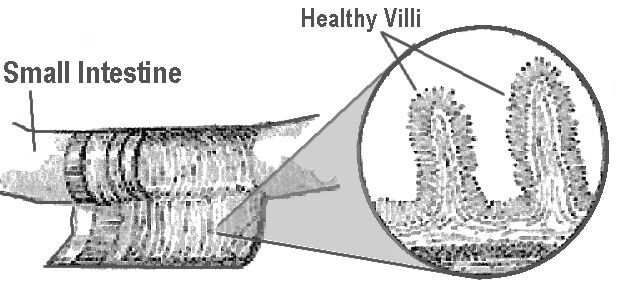|
|
|
Feeling lost ?? maybe you just need help with directions |
|

More information on CD and DH
can be found on the above
links noted as "Symptoms"
Pamphlet describing CD/DH
NPR - 5 min. Movie on The Human Biome(really a great presentation!!)
Please note, this information is intended for reference only. Gluten related illnesses can be extremely
serious conditions. Persons concerned that they may have indications of these illnesses, should
contact their medical professional for further consultation. We ask that you DO NOT begin a
gluten-free diet without medical consultation and testing or the results of your tests could be inaccurate.
|
What is Gluten Sensitive Enteropathy ? |
|---|
|
GSE or Gluten Sensitive Enteropathy encompasses any autoimmune reaction to gluten. The primary difference between Celiac Disease (CD) or Dermatitis Herpetiformis (DH) and GSE is that there is no visible damage present in the small intestine, no skin leisions with IgA present and the blood test normally used to test for CD/DH is not accurate to diagnose GSE. Current research does indicate that the same genetics present for CD/DH are also present for GSE. Research on GSE is on-going though it primarily seems to affect the body by weakening it's ability to deal with other conditions and exacerbating symptoms from other illnesses. A gluten free diet appears to reduce the symptoms as well as improve the patients' sense of overall health and well-being. Approximately 15-25% of the population may possess the genetics to have GSE. RELATED CONDITIONS (html) original text with links at celiac.com
|
|
What is Celiac Disease ? |
|
Celiac disease (CD) is commonly referred to as gluten sensitive enteropathy (GSE), gluten intolerance, or celiac sprue. Though Celiac Disease or celiac sprue are the more accurate terminology. It is considered to be the most under-diagnosed common disease today, potentially affecting 1 in every 133 people in the USA. It is a chronic, inherited disease, and if untreated can ultimately lead to malnutrition, additional autoimmune conditions, systemic damage from malnutrition and cancers. CD is the result of an immune-mediated response to the ingestion of gluten (from wheat, rye, and barley) that damages the villi in the small intestine. Once enough of the villi are destroyed, nutrients quickly pass through the small intestine, rather than being absorbed.
To develop celiac disease (CD) three things must be present: 1) you must inherit the gene, 2) be consuming gluten, and 3) have the gene "triggered". Common triggers may include stress, trauma (surgeries, pregnancy, etc.), and viral infections. Approximately 1 in 20 first-degree relatives could have CD triggered in their lifetime. The disease is permanent and damage to the small intestine will occur every time you consume gluten, regardless if symptoms are present. The only cure for Celiac Disease at this time is a gluten free diet.
|
|
What is Dermatitis Herpetiformis ? |
|
Dermatitis herpetiformis (DH) is a chronic disease of the skin marked by groups of watery, itchy blisters that may resemble pimples or blisters. The ingestion of gluten (from wheat, rye, and barley) triggers an immune system response that deposits a substance, lgA (Immunoglobulin A), under the top layer of skin. IgA is present in affected as well as unaffected skin. DH is a hereditary autoimmune gluten intolerance disease linked with celiac disease. If you have DH, you always have gluten intolerance. With DH, the primary lesion is on the skin, whereas with celiac disease the lesions are in the small intestine. The degree of damage to the small intestine is often less severe or more patchy than those with celiac disease. Both diseases are permanent, and symptoms/damage will occur after consuming gluten.
|
|
What is a Wheat Allergy ? |
|
An "allergy" to wheat is known as an IgE reaction. This can be tested for with a blood test known as an ELISA. While allergic reactions can be treated with anti-histamines, most people prefer to simply eliminate wheat from their diet rather than be dependent on medications. In addition, by eliminating the offending food (rather than using medication), most people find that their general sense of well-being and overall health is improved. |
Copyright(c) 2020 - Bellingham Gluten Information Group. All rights reserved.
info@glutenfreeway.info










 Blood Test
Blood Test
